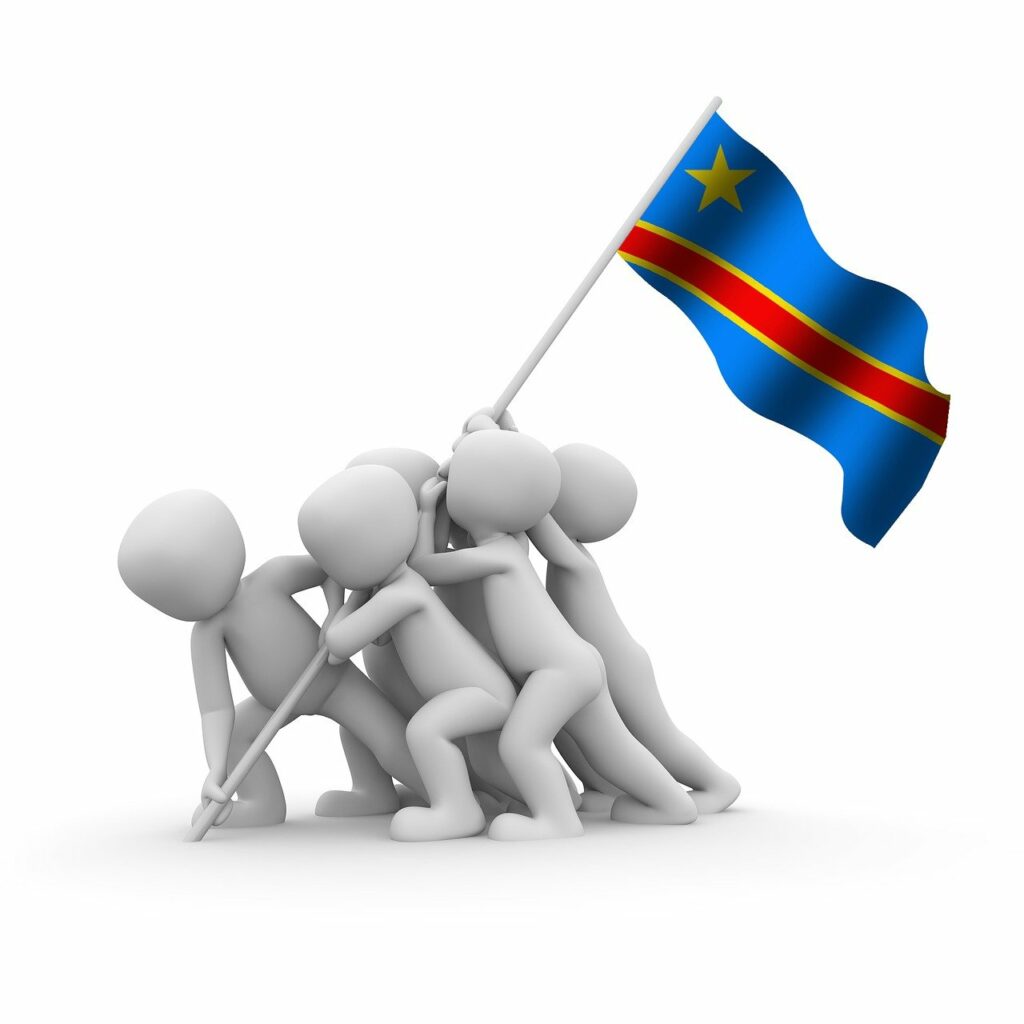“Democracy developed because masses of people organized collectively to demand it” What happens when this is not the case?

Current Congolese democracy was founded on very shaky foundations. This is one of the elements explaining the present democratic pitfalls.
Democracy is probably “the darling” of political systems in contemporary times. We can easily notice it in political speeches, daily news or casual conversations. It seems that democracy achieves such a consensus in our society that its political supremacy has become a given. In many respects, this observation is positive. Indeed, this system, as mentioned in the Justice & Peace Study on the Common Good, stay " the least bad of political systems, the only one capable of guaranteeing the conditions necessary for the common good ". The intrinsic value of this system is found in its consecration of public discussion or debate which “ guarantees spaces of fundamental freedoms: those of being able to express oneself, to think and to act on the destiny of one's political community ". However, could the virtues of this system justify its imposition? Intuitively, we want to respond negatively. However, this analysis will familiarize us with the notion that several countries, particularly in Sub-Saharan Africa, have adopted the democratic system through coercion. Through the example of the Democratic Republic of Congo (DRC), we will look at this often hidden reality which, however, in our opinion, provides some information on certain contemporary democratic pitfalls.
Waves of democratization
“Wave of democratization” is a concept introduced by the American political scientist, Samuel Huntington[1], in the early 1990s. Given that his work had an explanatory and not a theoretical goal, there are several theoretical approaches attached to this concept. Here we opt for the approach according to which a wave of democratization is “ a coherent set of democratic transitions linked to each other »[2]. Vsevolod Gunitskiy, political scientist and professor at the University of Toronto, explains to us that: “ the hallmarks of democratic developments [the most recents]are episodes of great upheaval and not stable and progressive changes »[3]. Waves of democratization, which can be understood as periods of important democratic transitions, are therefore linked to these periods of great upheaval. Gunitskiy then specifies that this comes from the fact that these are synonymous with abrupt changes in the distribution of power. These changes then create advantageous circumstances for the expansion of the political regimes of hegemonic countries which turn out to be democracies. Gunitskiy presents three different mechanisms for imposing the political regime of the new hegemon: “ coercion, influence and emulation »[4]. The first refers to the capacity, both in terms of power (soldiers and weapons) and opportunities, to intervene militarily. Concerning influence, the author relies on the capacity to extend the networks of commercial exchanges and patronage creating " opportunities to significantly alter the institutional preferences and power dynamics of coalitions within multiple countries at once »[5]. For the last mechanism, Gunitskiy sums it up as follows: “ success is contagious »[6]. In other words, the victory and therefore the success of the hegemonic regime inspires other nations and makes it attractive.
These three mechanisms combined, even before their conscious and deliberate activation, give the hegemon quite considerable persuasive power. However, as much as the first two mechanisms are quite explicit on the restrictive aspect, the last one is a little more subtle. Indeed, it is only through the introduction of the concept of symbolic violence that constraint is revealed. Pierre Bourdieu, an eminent French sociologist, defines symbolic violence as “ the power to impose a system of thought as legitimate on a 'dominated' population, through education and the media »[7]. This is'a notion recognized in the social sciences which designates “ a form of violence that is barely visible and non-physical, which is expressed through social norms and which is observed in social structures ". It appears through an imposition of the norms of the dominant group on those of the dominated group. The desire to resemble the hegemon is not innocent, but comes from relations of domination which manifest themselves through the construction of conscious or sometimes even unconscious political preferences.
Careful examination of these periods of great upheaval will give us interesting information on the subject that interests us in this analysis, that is to say democratic transitions in the world. One of these big changes was the end of the Cold War. Indeed, this event was very significant, because it announced the end of the bipolar era, with on one side, the allies of the Americans and their ideology of liberal democracy and on the other, the allies of the Soviets and their communist ideology. The end of the Cold War was, in a way, the advent of American hegemony. This political supremacy offers the new hegemon “ incentives and opportunities to impose domestic reforms on many countries in order to replicate the institutional features of one's own regime »[8].
The case of the DRC
Before looking at the case of the DRC, it is important to provide a clarification: For the moment, studies count three waves of democratization, each linked to an international shock. We will focus on the third wave in particular, because it involves the democratization of the Democratic Republic of Congo. This third wave is the one which follows the great upheaval that we mentioned previously, that is to say the end of the Cold War at the beginning of the 1990s. As explained above, this shock propelled the United States from America to the rank of international hegemon after the fall of its adversary, the Soviet Union.
The DRC, formerly known as Zaire, was under the authority of Mobutu Sese Seko for more than 20 years. Officially presented as its president, we can consider that Mobutu was indeed a dictator given that he had given himself a monopoly on power. Mobutu had risen to this position notably through tricks and stratagems in the troubled times of the beginning of the Democratic Republic of Congo between the years 1960 and 1965, but above all thanks to the help of his powerful American and Belgian allies. The former feared that the country would fall under Soviet influence through Patrice Emery Lumumba, the first Congolese Prime Minister following the country's independence in 1960, while the latter wanted to get rid of the latter for his radical positions against the former colonial authority. Mobutu cherishes these alliances, particularly the one with the Americans. He recognized the crucial importance of this alliance in his ability to maintain his domestic authority, because the United States was one of the world's two superpowers. However, at the end of the Cold War, American policy was no longer driven by fear of communist expansion, but rather by a campaign to promote, or more precisely, intensively impose liberal democracy. Under the persuasive effect of the regime imposition mechanisms mentioned above, Mobutu agreed to launch major so-called democratic political reforms by ceding his political power to a national assembly and by appointing a transitional government whose main objective would be the organization of elections. Through this example, we see that rather than having developed because “ masses of people organized collectively to demand it »[9], Congolese democracy has rather been “ the result of fluctuations within the international political system »[10]. Its fluctuations led Mobutu to reform the Congolese political system to match the characteristics of the new hegemon and establish what we will call a weak democracy.
You should know that at that time, the "school of democratization", a current of American political thought which strongly inspired American interventionist policies in the 1990s and 2000s, affirmed that “political transitions to more open government could take place under virtually any social, historical and structural conditions as long as the political conditions, that is, the construction of adequate democratic institutions, are managed by elites local politicians and powerful international actors »[11]. This current was also based on “ the belief that electoral processes can significantly resolve violent conflicts and ease internal tensions and that countries emerging from authoritarian rule tended to move toward democratic rule. This perspective is reflected in the common Western notion of the innate transformative power of the democratic system, evidenced by mainstream media interpretations »[12]. In other words, it is the belief that democracy can be reproduced in any context because it has the power to transform the systemic order in place in any country, until eradicate one of the characteristics of this order, such as violent conflicts in the case of the DRC. It is clear that this type of democratic reproduction has not succeeded in eradicating violent conflicts in the DRC, or even in other countries such as Iraq or Afghanistan, to cite other examples. This significantly calls into question the transformative power of democracy. Accordingly, we can reject the notion that a rigorous reproduction of democracy in any context essentially requires only good political management of regime transition. Indeed, the establishment of democracy implies several additional essential conditions, notably the sovereignty of the people and their massive participation.
A weakened democratic body
Current Congolese democracy comes directly from the Mobutist reforms of the 1990s. However, as we have seen, these democratic reforms, encouraged by the Americans and which were to transform the country to its very core, did not have the expected effects. . We note the perpetuation of many democratic pitfalls, notably, and in far too many cases, the absence of'spaces of fundamental freedoms: those of being able to express oneself, to think and to act on the destiny of one's political community. Based on our analysis, we can admit that it is normal for the democratic exercise to regularly get stuck on fundamental questions. How can a human body be expected to move without the beating of its heart? In the same way, it is impossible for Congolese democracy to move at full speed without its heart which is none other than its people. Without the daily expression of its political will and without its massive participation in public affairs, in other words the republic, it is difficult to envisage a healthy Congolese democracy...
Emmanuel Tshimanga.
[1] Huntington, S., 1993. The third wave: Democratization in the Late Twentieth Century. Norman, Oklah.: University of Oklahoma.
[2] Kurzman, C., 1998. Waves of democratization. Studies in Comparative International Development, 33(1), pp.42-64.
[3] Gunitsky, V., 2014. From Shocks to Waves: Hegemonic Transitions and Democratization in the Twentieth Century. SSRN Electronic Journal.
[4] Ibid.
[5] Ibid.
[6] Ibid.
[7] Bourdieu, P. and Passeron, J., 1970. Reproduction. Elements for a theory of the teaching system. France: Les Editions de Minuit.
[8] Gunitsky, V., 2014. From Shocks to Waves: Hegemonic Transitions and Democratization in the Twentieth Century. SSRN Electronic Journal.
[9] Arias, E. and Goldstein, D., 2010. Violent democracies in Latin America. Durham: Duke University Press, p.15.
[10] Gunitsky, V., 2014. From Shocks to Waves: Hegemonic Transitions and Democratization in the Twentieth Century. SSRN Electronic Journal.
[11] Arias, E. and Goldstein, D., 2010. Violent democracies in Latin America. Durham: Duke University Press, p.7.
[12] Ibid.





